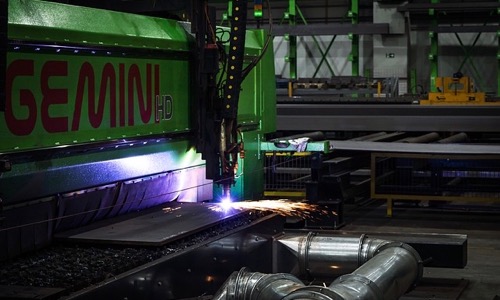For a while now, it has seemed that progressing technology has put society one step closer to the next great transformation.
These types of transformations are certainly taking shape when it comes to manufacturing things, as many herald the fourth industrial revolution, or Industry 4.0.
Industry 4.0 is the continuation of bringing digital technology into the workspace, especially in the manufacturing industry, and is something that is actively taking shape in communities around the country.
Industry 4.0 crosses over with many concepts like the Internet of Things and the next stage of mobile connectivity. The major technology concepts that make up Industry 4.0 include big data, advanced analysis of said data, human-machine interaction through augmented reality and digital to physical transfers to things like 3-D printing.
Big data and the sensors that are recording the data are helping companies streamline processes, make changes to their systems and find things they didn’t know that was happening. Coupled with advanced analytics, companies can improve product development and reach customers in a more effective manner.
Augmented reality is making workers’ lives easy when they’re out in the field with heads up displays that can let them compare real-life setting to schematics and 3-D printing is allowing for better parts to be created on the fly.
New technologies and the Smart Factory
Industry 4.0 has been valued at nearly $4 trillion and will make our factories smarter by giving us the ability to further automate.
Big data and interaction with machines is one thing, but there’s a lot of technology that’s driving the fourth industrial revolution.
People are developing robots and more complicated automation processes that will work alongside human workers in a factory setting.
Industrial Internet of Things will further enable interconnectivity of technologies to create seamless manufacturing processes. Think of a system where a smart factory creates products that will eventually be placed in an autonomous vehicle that will then drive it off to the destination without the assistance of humans.
According to studies, smart factories are estimated to deliver $500 billion in value by 2022. These facilities will be able to increase productivity, and accelerate on-time delivery of products.
Then, there’s how these technologies are connected. With everything digital, there will be more vulnerabilities to hacking. It will be imperative for folks to create cybersecurity systems that will be able to protect these large networks.
Big Changes
Industry 4.0 is changing the way we work, just like many other technological advancements. With technology advancing so quickly, a new generation of life-long learners will have to be developed.
Robotics and automation are forcing not just companies to stay competitive, but also the workers. People may have to move more quickly and learn new skills to stay competitive in this changing space of employment.
Currently, we’re in a time where factories and businesses are transitioning over to Industry 4.0 technologies that will give some businesses a leg-up over others. It will be important to cover how local manufacturers in your community are adopting these technologies.
Are they lagging? Are they running into issues with finding skilled workers? Or will workforces continued to be cut back? Be sure to examine how Industry 4.0 is playing out for local manufacturing companies from not just the adoption, but what it will mean for people.











